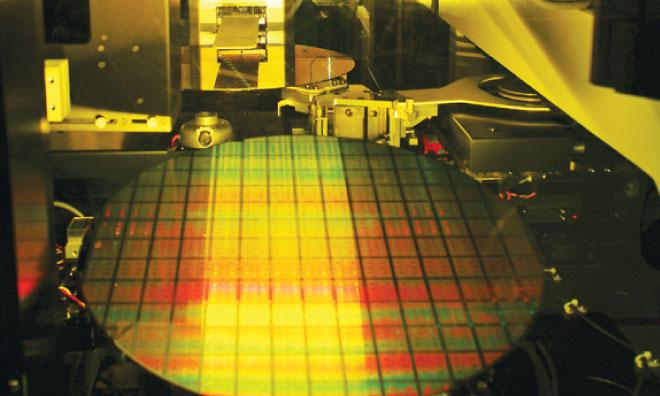A new report out of Taiwan suggests that Apple will not only diversify the supply chain for its next-generation A-series processors, but that the company will also make the leap to a much more advanced fabrication process.
TSMC's 12-inch wafer fab
Taipei, Taiwan-based TSMC is expected to handle 60 to 70 percent of Apple's processor fabrication business in 2015, according to a report from Taiwanese trade publication Digitimes. South Korean conglomerate Samsung, Apple's current fab partner, is said to have secured the balance of Cupertino's order.
The numbers match up with an earlier report from The Korea Economic Daily.
Along with the supplier change, the paper speculates, will come a shift to a new, 14- and 16-nanometer FinFET-based fabrication process. Apple's A7, which powers the iPhone 5s, iPad Air, and iPad mini with Retina display, is built exclusively by Samsung on a 28-nanometer process fab.
Apple is believed to be preparing to manufacture its next-generation "A8" chip using TSMC's 20-nanometer process in 2014. TSMC has recently begun ramping production on its 20-nanometer lines and analysts believe Apple's business could comprise as much as 10 percent of TSMC's 2014 revenues.
TSMC CEO Mark Liu has predicted that the company's 16-nanometer fab would be up and running by the end of 2014, while Samsung has said their 14-nanometer process would be ready at approximately the same time. However, the companies' move to the new FinFET-based processes could prove difficult, industry experts have told AppleInsider.
Jumping from, for instance, the 28-nanometer node to the 20-nanometer node is largely an exercise in making things smaller. Moving from traditional planar transistors to FinFET — Â essentially a new, "three dimensional" type of transistor — Â on the other hand means an entirely new manufacturing process.
As it stands today, only Intel has the capability to manufacture FinFET-based devices in commercial quantities.
 Shane Cole
Shane Cole








 Chip Loder
Chip Loder
 Wesley Hilliard
Wesley Hilliard
 Marko Zivkovic
Marko Zivkovic

 Christine McKee
Christine McKee
 Amber Neely
Amber Neely

 Malcolm Owen
Malcolm Owen








38 Comments
This must be shaking up the industry! I wish Apple would develop their own GPUs too. I am so sick of the Achilles' heel of Macs, Nvidia et al.
This must be shaking up the industry! I wish Apple would develop their own GPUs too. I am so sick of the Achilles' heel of Macs, Nvidia et al.
What is your complaint with NVIDIA graphics, specifically? They are not all that bad from what I understand.
They don't do these things quickly. They will have a test plant up and running for at least a year before they can be assured that production will function the way they expect. The one thing I get nervous about TSMC is their problems with new process technologies. They always have problems.
[quote name="pmz" url="/t/161238/rumor-apple-to-shrink-a-series-chips-to-14nm-in-2015-tsmc-to-lead-production#post_2447534"]What is your complaint with NVIDIA graphics, specifically? They are not all that bad from what I understand. [/quote] What does Nvidia have to do with Apple's "A" series of chips? They use Imagination's GPUs. The Nvidia ARM graphics performance is terrible. Apple would never go to them, and they don't offer it anyway. I know he mentioned Nvidia and Macs, but this is the wrong forum for that. But I would love to have Apple convince Imagination to give them an architecture license, the way they have one from ARM. As Apple owns 11% of Imagination, one wonders if they have enough influence to convince them to do that. And exclusive license for that would be great. Apple has bought a number of small GPU design companies over the past few years. I've never seen anything that could be said to have come out of those purchases.
[quote name="pmz" url="/t/161238/rumor-apple-to-shrink-a-series-chips-to-14nm-in-2015-tsmc-to-lead-production#post_2447534"]What is your complaint with NVIDIA graphics, specifically? They are not all that bad from what I understand. [/quote] MacBook Pro failure rates over the years .... I wasn't thinking the Mac Pro cards, sorry that was misleading in a Mac Pro thread.